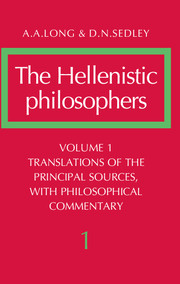Stoicism
from Translations and commentary
Published online by Cambridge University Press: 05 June 2012
Summary
The philosophical curriculum
Aetius 1, Preface 2 (SVF 2.35)
The Stoics said that wisdom is scientific knowledge of the divine and the human, and that philosophy is the practice of expertise in utility. Virtue singly and at its highest is utility, and virtues, at their most generic, are triple – the physical one, the ethical one, and the logical one. For this reason philosophy also has three parts – physics, ethics and logic. Physics is practised whenever we investigate the world and its contents, ethics is our engagement with human life, and logic our engagement with discourse, which they also call dialectic.
Diogenes Laertius 7.39–41
(1) They [the Stoics] say that philosophical discourse has three parts, one of these being physical, another ethical, and another logical. This division was first made by Zeno of Citium in his book On discourse, and also by Chrysippus in his On discourse book 1 and in his Physics book 1 … and by Diogenes of Babylon and Posidonius. (2) Apollodorus calls these parts ‘topics’, Chrysippus and Eudromus ‘species’, and others ‘genera’. (3) They compare philosophy to a living being, likening logic to bones and sinews, ethics to the fleshier parts, and physics to the soul. They make a further comparison to an egg: logic is the outside, ethics what comes next, and physics the innermost parts; or to a fertile field: the surrounding wall corresponds to logic, its fruit to ethics, and its land or trees to physics; or to a city which is well fortified and governed according to reason.
Information
- Type
- Chapter
- Information
- The Hellenistic Philosophers , pp. 158 - 437Publisher: Cambridge University PressPrint publication year: 1987
